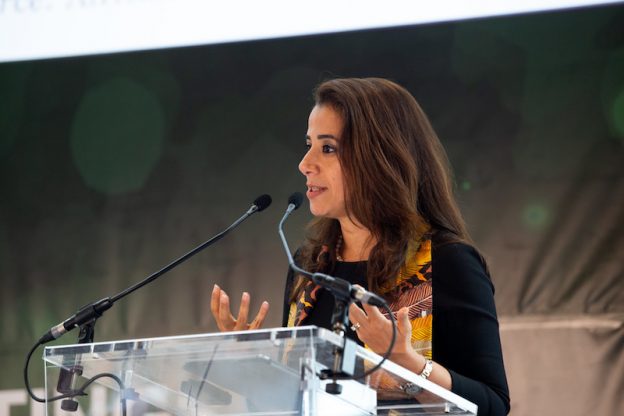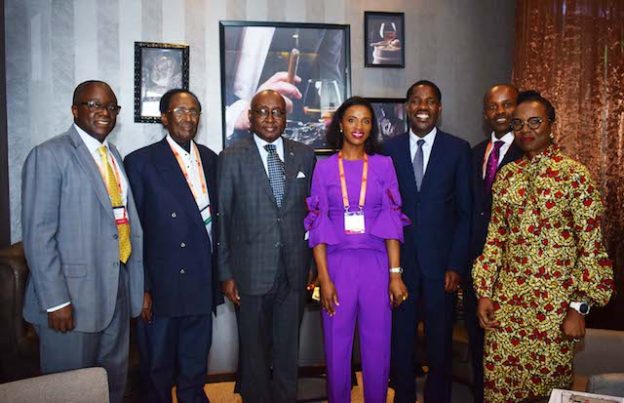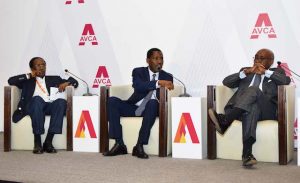The African Development Bank (AfDB) Group held their 2019 series of annual meetings from 11 to 14 June in Malabo, Equatorial Guinea with the theme of “Regional Integration”
Highlights of the meetings:
1. Fast growth is not Enough: A key theme of the week was that the stellar growth levels in Africa (over 4%) were still not enough to create enough jobs and produce sufficient food on the continent.
Africa’s labor force is projected to be nearly 40% larger by 2030. If current
trends continue, only half of new labor force entrants will find employment, most jobs will be in the informal sector. Close to 100 million young people could be without jobs. #2019AEO #AfDBAM2019— ONE (@ONEinAfrica) June 11, 2019
"The Africa where people live on less than $5 a day is a problem," says VP Khaled Sherif, citing 4 main challenges to integration & #privatesector development in Africa: low levels of industrialization, lack of jobs, lack of value addition and infrastructure. #AfDBAM2019 pic.twitter.com/kSTARiCzQT
— African Development Bank Group (@AfDB_Group) June 14, 2019
"We must pay particular attention to 3 factors: extreme rural poverty, high rates of unemployment among the youths and climate and environmental degradation-the 'disaster triangle'. @akin_adesina #AfDBAM2019 https://t.co/3abdz5R8lz pic.twitter.com/cFHaeLbq69
— Aly-Khan Satchu (@alykhansatchu) June 12, 2019
2. High 5’s: Regional Integration is one of the development priority themes (‘ High 5s’) that the Bank had adopted at its 2016 meetings in Lusaka, Zambia alongside (to) “Light up and power Africa”, “Feed Africa”, “Industrialise Africa”, and “Improve the quality of life of the people of Africa.”
-65% of the world’s uncultivated arable land ( 400 million ha ) is in Africa
-51% of the population is engaged in Agriculture but contribute only one quarter of Africa’s GDP
-US$ 47 billion was spent on food imports into subsuharan Africa in 2017 #AfDBAM2019— Uzayisenga Hélène (@UzayisengaHlne) June 13, 2019
The global agro-industry business is worth $8 trillion – it is 9X bigger than ICT, 10X bigger than the auto industry – yet African countries look down on this huge opportunity for African agriculture – Professor Oyebanji Oyelaran-Oyeyinka #AfDBAM2019 #High5s https://t.co/NCsIaSUR67
— Bankelele (@bankelele) June 13, 2019
3. It is Capital Raising time for the Bank and is organs. There are advanced talks towards a 7th general capital increase, the first since 2010, for the African Development Bank, which will be concluded in September.
We had an excellent exchange with shareholders and they are impressed with the work of the bank. They will meet in September, in Sharm El-Sheikh Egypt, to fine-tune aspects of capital raising and will announce the results in October – @akin_adesina #AfDBAM2019
— Bankelele (@bankelele) June 14, 2019
A few months ago, Canada provided temporary callable capital of up to $1.1 billion to stabilize the AAA rating of the Bank.
[ON AIR] #AfDBAM2019: "I would like to plead in favour of a general capital increase of the @AfDB_Group to enable the bank to further promote and facilitate economic growth and development in #Africa" – Félix Tshisekedi, President of the #DRC. #CNBCAfrica pic.twitter.com/Vr2ezG9hUz
— CNBC Africa (@cnbcafrica) June 12, 2019
There are also ongoing negotiations for a 15th replenishment of the African Development Fund.
4. Visa Index: The Bank’s Africa Visa Openness Index ranks how accessible African countries are to visitors from within the continent in terms of requiring travel visas and tracks developments by different countries to improve the ease of travel for fellow African citizens.
25 % of African countries no longer require visas for African citizens
24 % grant them visas upon arrival
51 % still treat them like far away foreigners
We can't expect Europe or America to be more welcoming to Africans than we are to ourselveshttps://t.co/J4YTJZJHWO #AfDBAM2019 pic.twitter.com/1zlB4oFm8t— Célestin Monga (@CelestinMonga) June 12, 2019
"Investments are like water – it goes where there is least resistence." – @akin_adesina on the strong and direct correlation between more open borders and higher level of investments. #AfDBAM2019 pic.twitter.com/Tj60RGTfpe
— African Development Bank Group (@AfDB_Group) June 12, 2019
5. Low intra-Africa trade: Ahead of the African Continental Free Trade Area (AfCFTA) which comes into force in July 2019, the potential economic benefits of full implementation were highlighted, with the greatest beneficiaries of the increased trade likely to be countries in the Central Africa region.
Africa has 54 countries; Alone they are not very competitive, but together, under the Continental Free Trade Agreement, they are a market of $3.4 trillion
The Continental Free Trade Area is the broadest free trade area since the establishment of the WTO .. Europe’s regional integration is at 70%, Asia’s at 60%, Africa is at 18% & with 16 landlocked countries, won’t grow without integration – @akin_adesina @AfDB_Group #AfDBAM2019
— Bankelele (@bankelele) June 10, 2019
Director Hanan Morsy lists the 3 policy actions that can increase GDP growth to 4.5% per year:
– removing bilateral tariffs
– eliminating non-tariff barriers
– keeping rules of origin simple #2019AEO #AfDBAM2019 pic.twitter.com/9cmCqPypmR— African Development Bank Group (@AfDB_Group) June 11, 2019
The Continental Free Trade Agreement can offer substantial gains – based on a number of scenarios and phase one can bring $2.8 billion in real income and increase intra-Africa trade by 15%, with the greatest gains felt in Central Africa – Dr. Hanan Morsy @AfDB_Group #AfDBAM2019
— Bankelele (@bankelele) June 11, 2019
Also see the regional economic outlook reports by the Bank.
6. Debt levels in Africa: There was some discussion about the levels and types of debt across Africa and their potential burden versus the growth and infrastructure needs of individual countries. Also the Bank affirmed its support to help countries negotiate better financing terms, get better deals for extractive resources, minimize currency risks, and to enable them to mobilize their own resources domestically.
While "unsustainable debt" "debt distress" & "debt traps" are back in the headlines 10 years after the last financial crisis, and while Africa's debt levels have increased, they are not unsustainable, and its financing needs remaining gigantic – @sbmizrahi #AfDBAM2019 https://t.co/kHEvAZxwhh
— Bankelele (@bankelele) June 13, 2019
Our loans are cheaper than #Eurobonds, @AfDB_Group tells African countries https://t.co/dPib9NodM4 #AfDBAM2019 #Malabo pic.twitter.com/OAWJZsX83f
— Cable Foundation (@CableFoundation) June 14, 2019
7. Asia-models for Africa: At the AfDBAM2019, Korea and India showcased their partnerships with the Bank including on agricultural transformation, enhancing food security and scaling financing across Africa.
Korea ranks “Tongil Rice” through which they achieved self-sufficiency in rice production, as their top national invention – ahead of CDMA, semiconductors, nuclear reactors, ship design, and high-speed trains – Professor Cho Gyoungrae #AfDBAM2019 #High5s https://t.co/NCsIaSUR67
— Bankelele (@bankelele) June 13, 2019
"Technology is key to agriculture development." Drawing from Korea's experience, Gyoungrae Cho, Dir of Intl Agriculture, shares lessons to take #agriculture in the continent to the next level 👉🏿 https://t.co/alDaesy2Qp #AfDBAM2019https://t.co/uuccoPL5t4 pic.twitter.com/6uasCAPD9p
— African Development Bank Group (@AfDB_Group) June 14, 2019
8. Different forms of development finance by the Bank:
- Toward Financial Inclusion
By 2030, the #ADFI will deploy $400 million in the form of grants & affordable loans to institutions that can effectively expand digital financial services, incl banks, remittance and payment service providers, FinTech companies, and regional economic organizations. #AfDBAM2019 pic.twitter.com/jFZJSfHI6a
— African Development Bank Group (@AfDB_Group) June 12, 2019
- Integration of Africa
The #AfCFTA will come into full force in July 2019. The Bank has granted $4.8 million to the @_AfricanUnion to help establish the secretariat & support programs
👉🏿https://t.co/GDvzfXEfbZ
How will an African Free Trade Area be beneficial to your country? Comment with #AfDBAM2019 pic.twitter.com/qaFCWKcZEr— African Development Bank Group (@AfDB_Group) June 11, 2019
- The Environment
The "Kandadji" project for the regeneration of ecosystems and the development of the Niger Valley will benefit from a $128.8 million financing agreement, signed by the Bank and Republic of #Niger yesterday at the #AfDBAM2019 👉🏿https://t.co/BzknD4sWvL pic.twitter.com/ffxP19dIuj
— African Development Bank Group (@AfDB_Group) June 12, 2019
- Food Security
It is a privilege & a pleasure to be the fund manager for the soon to be $100 million #KOAFEC Trust Fund at #AfDB. Below one of the studies we approved for financing. While a challenging role, the outputs like this make it worthwhile 🤗 #feedAfrica #Seoul https://t.co/cp4iKOreCw
— nanaspio (@nanaspio) June 7, 2019
Hopeful that the pledged $17m to replenish the Africa Solidarity Trust Fund is just an initial step to tackle #FoodSecurity and eliminate rural poverty on the continent. #AfDBAM2019
— Kwame Bekoe (@kbekoe) June 13, 2019
- Disaster Relief
#AfDBAM2019 Adesina says AfDB committed $100 million to help rebuild #Mozambique #Malawi #Zimbabwe after cyclones
— Godfrey Mutizwa (@gmutizwa) June 12, 2019
Last year’s edition of the #AfricaInvestmentForum secured investment interests valued at $39 billion including, for example, a $2.6 billion agreement to develop and finance the Accra Ai Skytrain.@AIFMarketPlace#AfDBAM2019
— African Development Bank Group (@AfDB_Group) June 13, 2019
- Clean Energy
The African desert is a huge solar power plant in the making. 'Desert to Power' aims to make use of this territory together with countries in the Sahel region to light up and power the region – enough to support 250 million people. ☀️💡#2019WDCD pic.twitter.com/slG2KPJDvm
— African Development Bank Group (@AfDB_Group) June 17, 2019
- They also have plans for an affirmative action finance facility for women in Africa (AFAWA).
9. Transformational Infrastructure Projects funded by the bank include ports, highways, bridges and border-crossing stations across different countries.
The Kazungula Bridge crossing the Zambezi river between Zambia and Botswana is set to be completed by 2020, reducing travel time from 8 days to half a day! 🌉 #AfDBAM2019pic.twitter.com/RL5s5ppyxl
— Ulrich Janse van Vuuren (@UlrichJvV) June 11, 2019
We need to communicate the impact of financing; the bridge between Senegal & Gambia, also connecting, Zambia to Zimbabwe was another transformative project as was the highway from Addis to Mombasa that increased trade between Ethiopia & Kenya by 400% – @akin_adesina #AfDBAM2019
— Bankelele (@bankelele) June 10, 2019
10. Malabo Image: Host nation, Equatorial Guinea, used the forum to shed an image about the country that is full of old stereotypes to one of economic diversification, transformation and infrastructure. President Obiang attended the opening of the AfDBAM2019 which were chaired by the country’s Minister of Finance, Cesar Abogo, who is just 39 years old.
Equatorial Guinea has a lot of stereotypes; people don't know what has happened in the decade – roads, electricity, ports, and if investors don’t know, they won't come from Cameron, Chad, Tanzania .. people think of the country from three decades ago – @CesarAbogo – #AfDBAM2019
— Bankelele (@bankelele) June 10, 2019
#PLEA: "…the Horizon 2020's 4 goals: 1) Equip the country with first class infrastructure 2) Enhance living conditions of the people 3) Create the foundation to diversify the economy 4) improve the performance of governance" – @cesarabogo, Equatorial Guinea FinMin #AfDBAM2019. pic.twitter.com/mqZ3srxEVg
— CNBC Africa (@cnbcafrica) June 11, 2019
There is no integration or free movement without security, says President Teodoro Obiang Nguema Mbasogo.#AfDBAM2019 https://t.co/GrTtGWjE8Y
— African Development Bank Group (@AfDB_Group) June 12, 2019
Attend NOW to the special event: "Harnessing the potential of Equatorial Guinea" Today June 13, 2019.
And the Knowledge Event. @GabrielObiang@AhoraEg @jmnchasoikaka @choi_afdb @CarlosEndje @gapega_ @fugamikue @JayNdongroberto #AfDBAM2019 #EquatorialGuinea pic.twitter.com/Y2DnnXJZCO
— Axana Botey M (@Axana_BM) June 13, 2019
(a) Parallel events during AfDBAM2019:
- Africa Investment Forum last year which at its inaugural AIF forum in 2018 in Johannesburg secured $38 billion of investments for 40 projects across Africa.
Quite obviously, the biggest achievement of the @AfDB_Group for 2018 is the 2018 Africa Investment Forum #AIF2018 which was able to not only attract to Africa, over US$38 billion in investments, but #market Africa’s huge #Investment Opportunities to global investors. #AfDBAM2019 pic.twitter.com/LC5AiSDGGR
— Nyeneokpon Ekanem (@essa3yist) June 13, 2019
- African Banker Awards
The @BankerAwards Bank of the Year was @Afreximbank, Investment Bank was @Absa, Retail Bank was @GroupEcobank, while the award for Financial Inclusion went to @BOINigeria #AfDBAM2019
— Bankelele (@bankelele) June 12, 2019
The @BankerAwards infrastructure deal went to TDB for a Mozambique FLNG (floating liquefied natural gas) project, debt deal to @EdeRothschild for a $2.2bn Senegal Govt Eurobond, while equity deal was the @SBGroup / @RMB_CIB Vivo Energy IPO https://t.co/GUJ6miSkmh #AfDBAM2019
— Bankelele (@bankelele) June 12, 2019
(b) Next meeting: Following these first-ever meetings to take place in Central Africa, the next annual meetings of the bank will be in a year’s time in Abidjan, Côte d’Ivoire – the bank’s headquarter city, where they the election of the Bank President will be the main agenda item.
The next annual meetings of the bank will be in Abidjan (May 25-29, 2020) where we will come together to elect a new president, or re-elect @akin_adesina, who in five years has pushed the bank to loftier heights – @niale_kaba, Governor for Côte d'Ivoire #AfDBAM2019
— Bankelele (@bankelele) June 14, 2019



